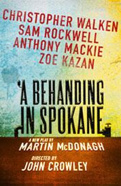What's Up, Anthony Mackie? The Behanding and Hurt Locker Star Handicaps the Oscars and Counts "F" Words
Three nights after his March 4 Broadway opening in Martin McDonagh's black comedy A Behanding in Spokane, Anthony Mackie will be walking the red carpet at the Academy Awards for his starring role as Sgt. J.T. Sanborn, the calm center in a Baghdad bomb squad, in Best Picture nominee The Hurt Locker. His current Broadway role is the polar opposite: Mackie plays a small-time con artist who gets the bright idea to sell a human hand to a one-handed drifter menacingly played by Christopher Walken. Chatting with Broadway.com during previews, Mackie was understandably giddy as he talked Oscar and the fun of trading barbs with Walken, Sam Rockwell and Zoe Kazan.
So, you’re getting a day off from A Behanding in Spokane for the Oscars?
As fate would have it, we have Sunday and Monday off right after opening. So I’m going!
Fantastic! What are you wearing?
I have no idea [laughs]. I have to find a tuxedo.
Prediction time: Is Kathryn Bigelow going to win Best Director?
Most definitely. It’s about time for a woman to win, and the great thing is, I think she’s going to win not because she’s a woman but because she directed the best movie of the year.
Will The Hurt Locker win Best Picture?
I think Avatar is going to win. The Academy upped it to 10 nominees so they could get some of their big weekend no-brain movies in, right? Because the studios don’t make good movies anymore. Avatar is the poster child for no-brain movies.
How did your movie, which didn’t catch on at the box office last summer, become a front-runner at the Oscars six months later?
Word of mouth. Kathryn made a really good movie on guts, glory and $11 million. It’s true filmmaking. Everybody thinks you have to lace your pockets [with cash] to make a movie, but she put together something that’s timeless and unique and that works on all levels.
Okay, let’s talk about the play. What’s the most fun thing about acting onstage with Christopher Walken?
You never know what he’s going to do or how he’s going to do it, so you just try to keep up. It’s like a tennis match. Truly, it’s like going to the playground every day. It’s very fun.
A lot of the play’s humor comes from name-calling that is beyond politically incorrect. How do you feel about that?
The first day of rehearsal I brought that up, and [playwright] Martin [McDonagh] and [director] John [Crowley] were very understanding and open-minded. They told me that if I wasn’t comfortable with something, we could talk about changing it. Specifically, being a black man in the theater, you have to be very conscious of everything that’s going on around you and everything you say. But the more we worked on it, the more I realized that it wasn’t gratuitous language; it added to the story and the themes of the play.
McDonagh writes equal-opportunity insults.
Exactly. Everybody gets it! It’s interesting—the audience is overwhelmingly middle-aged white people. So when a group of Juilliard students, friends my age who are black, came, they said that the language was jarring at first. But two or three lines after that, you see why we talk the way we do. It shows how smart a writer [McDonagh] is.
Speaking of language, has anybody counted how many times you use some form of the “f” word in the play?
[Laughs.] We have a peanut jar downstairs at the theater, and everybody involved in the production wrote how many times they think I say it on a $5 bill and put it in the jar. At the end of the run, the person who is closest will win the money.
You went from that crazy production of The Bacchae in Central Park last summer [as Pentheus] to this play. What a constrast!
I like to do good plays. The thing about The Bacchae is that not too many people can say they did Shakespeare in the Park with [director] JoAnne Akalaitis. She exemplifies the type of people I want to work with in the theater. Good or bad, that play was a theatergoing experience. I think a lot of times, we go to theater and we’re left without an experience.
Other than The Hurt Locker, what movie are you proudest of?
My first movie with Spike Lee, Sucker Free City, and my very first movie, Brother to Brother—I felt like I did my best work as an actor on those two.
How interesting that you would choose two of your earliest performances.
When I read the [Brother to Brother] script, the writer/director [Rodney Evans] wanted me to play another character. He thought, “You’re not gay—you can’t play a gay character.” I’m like, “Well, being gay is based on the fact that you’re attracted to someone of the same sex. Attraction has to do with love. Everyone deserves to be loved. We experience and feel love the same way. You just happen to love penis the way I love vagina.”
I’m not sure any question or answer can top that! Best of luck in A Behanding in Spokane.
Thank you so much! Christopher and Sam and Zoe and I have an intense level of commitment to this play. I’ve never been involved in a project like this where there’s not a single weak link.
Related Shows
Articles Trending Now
- 2025 Drama League Nominations Announced; Idina Menzel, Helen J Shen, Nicole Scherzinger, Lea Salonga and More Up for Awards
- Tony Winners Wendell Pierce and Sarah Paulson Will Announce 2025 Tony Nominations
- Redwood, Starring Idina Menzel, Will Release an Original Broadway Cast Recording in May; Debut Track Out Today
